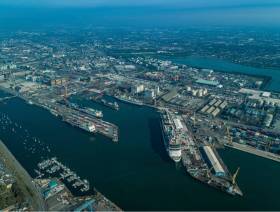Displaying items by tag: Brexitberths
Large Cruiseship Signals ‘End of an Era’ for Irish Cruise Tourism Following Dublin Port Cruise Ban
#cruiseliners - The arrival of thousands of well-travelled North American visitors on a huge cruiseship today could signal the ‘‘end of an era’’ due to actions of the Dublin Port Company, that's according to a group of businesses from across the tourism, retail and transport sectors.
The All-Ireland Cruise Ship Action Group (AICSAG) which was formed to campaign against the ban on cruiseships entering Dublin Port from 2021 has welcomed the influx of visitors due to the arrival of cruiseship Celebrity Reflection in the port today. (Afloat adds even larger capacity cruiseships have docked in the port previously).
Celebrity Reflection which holds 3,600 high-spending passengers from North America, is in Dublin for a ‘turnaround’, an industry term used when one group of passengers leave a cruise ship after a cruise and fly out of Ireland while another group of passengers jet into Dublin to join for a new cruise. Many of these high net worth individuals continue to spend time on the island of Ireland after their cruise ends.
According to AICSAG, turnarounds are believed to be worth up to €100 million to the Irish tourism industry but have now been banned by the Dublin Port Company.
Up until recently, the Dublin Port Company have been extremely active in promoting cruise tourism and were actively marketing to international cruise lines, such as Celebrity.
The decision by the Dublin Port Company to stop cruise ships docking at Dublin Port from 2021 was according to the Group taken without any consultations or engagement with the Minister for Transport, Tourism and Sport, local businesses, Dublin City Council, or the other Irish ports, namely Belfast, Waterford and Cork, who will be severely impacted by this decision.
Cruise companies market Ireland as a destination, and in addition to Dublin large cruise ships often stop off at Belfast, Waterford and Cork. Without access to Dublin Port, cruise companies will no longer stop in other Irish ports and will take hundreds of thousands of passengers out of Ireland to other European destinations.
Afloat.ie today contacted Dublin Port Company which issued the following statement in response to AICSAG.
The berth restrictions we are introducing in 2021 are intended to last three years (i.e. from 2021 to 2023) while we undertake major construction works on a 400 metre quay wall, Alexandra Quay West. (Afloat adds this quay forms part of Alexandra Basin).
As regards the long-term, we have planning permission to develop new berths suitable for cruise ships immediately east of the Tom Clark Bridge [East-Link] at an estimated cost of €100m. This is the subject of a cost benefit analysis study which is currently underway and which will be finished by mid-year.
We intend publishing this study as part of a public consultation process (including with the cruise industry) to ensure that a €100m investment by Dublin Port would be viable. Subject to the outcome of this process, the new berths would be constructed in 2024 / 2025 and be available in 2026.
In addition to the statement, DPC has supplied Afloat.ie with a Briefing Document for the Minister for Transport Shane Ross on Dublin Port’s new cruise ship berthing and pricing policy.
The detailed document published in March, covers many aspects including the Alexandra Basin Redevelopment Project (ABR) and as alluded above new cruise berths [at the North Wall Extension] available in 2026.





























































